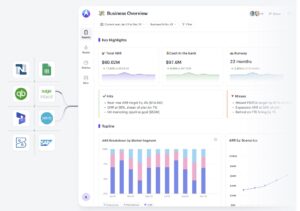Corporate finance has often been synonymous with spreadsheets, manual reconciliations, and endless hours of number-crunching. But that paradigm is changing fast. Artificial intelligence is ushering in a new era. This is one where finance teams move from reactive reporting to proactive, real-time strategy.
At the forefront of this shift is Drivetrain.ai, an AI-native business planning platform that helps organizations plan and execute with precision. With the release of its State of AI in FP&A report, Drivetrain offers one of the most comprehensive looks into how financial planning and analysis (FP&A) teams are adopting AI, the challenges they face, and the opportunities that lie ahead.
We sat down with Alok Goel, CEO and Co-founder of Drivetrain, to discuss the findings, his entrepreneurial journey, and how Drivetrain is helping finance leaders transition from spreadsheets to smart systems.
The Interview
Q: Alok, could you start by telling us about your background and what led you to co-found Drivetrain?
Alok Goel: My career has always been about how technology can change the game. At Google, I worked on products like Display Ads, Mobile Search, and Search itself. Later, as a venture capitalist at Elevation Capital, I invested in SaaS, fintech, and consumer tech startups.
What struck me in those boardrooms was how uneven the playing field was. Companies with big, well-resourced finance teams had all the data and insights they needed to make smart decisions. At others, CEOs were often cobbling together answers with whatever tools they could manage. It didn’t feel fair.
When I saw how transformative AI could be, it clicked: we could give every leadership team access to the same level of intelligence, no matter their size. That is the idea that sparked Drivetrain.
Q: Your new State of AI in FP&A report highlights major shifts in finance. What stood out most to you in the findings?
Alok Goel: The big eye-opener wasn’t that 79% of finance teams are already using AI, it was how much the talent mix is changing. We’re seeing finance leaders shift from hiring people from more traditional finance backgrounds to hiring people like AI Analysts and AI Systems Experts, folks with data and engineering backgrounds.
That’s a huge shift. A decade ago, these roles didn’t even exist. Now they’re becoming essential. It shows that AI isn’t just another tool but it’s reshaping what it means to work in finance. And with that comes a challenge: people in finance need to reskill quickly or risk being left behind. Just like spreadsheets revolutionized the industry in the 1980s, AI is doing the same thing now, but at a much faster pace.
Q: The report also uncovered gaps in governance and learning. Why are these areas so critical?
Alok Goel: Adopting AI isn’t just about plugging in new software. It’s about trust and transformation. Without proper guardrails, like explainability, output validation, and access controls, your organization can risk bad data, compliance failures, or even flawed decisions that could sink a company. Governance is what makes AI reliable.
The learning gap is equally urgent and concerning. In this new era, the ability to learn fast is a competitive edge. Treating AI fluency as an optional extra won’t cut it. Finance teams need structured, company-wide learning programs. For AI to become a core strength, it has to be treated like any other critical system with the right investment, intention, and accountability.
Q: How do you see AI transforming finance compared to other industries like healthcare or retail?
Alok Goel: Finance has long been seen as the “rearview mirror” of the business, tracking what happens while other teams drive strategy. AI flips that around. For the first time, finance isn’t just reporting the past, it’s helping to shape the future.
By connecting insights across the company, AI makes finance the brain of the organization. Finance teams move from scorekeepers to copilots, guiding decisions in real time. It’s a shift from hindsight to foresight, from reporting to orchestrating. Once finance takes that role, the whole business can move faster and with more confidence.
Q: Your blog highlights use cases for generative AI in finance. Which of these do you see driving the most value right now?
Alok Goel: One of the biggest wins we’re seeing is in reporting like board and monthly close reports. These used to take days of pulling data, writing commentary, and formatting slides. Now, AI can handle the heavy lifting in minutes: ingesting the data, generating first drafts, flagging key trends, and even writing consistent narratives.
This isn’t just about speed, it’s about freeing up finance leaders to focus on strategy. Instead of rushing to “get the deck out,” they can spend their energy answering bigger questions like, “Why did CAC spike in Q2? or Are we underestimating churn risk? That shift from grunt work to strategic thinking is where the real value is.
Q: Some worry that AI could replace finance jobs. What’s your perspective?
Alok Goel: I don’t see AI replacing finance jobs. I see it expanding what finance teams can do. Think back to the move from handwritten ledgers to spreadsheets. That didn’t eliminate jobs but it did change them. It cut down on errors, sped things up, and gave people space to work on higher-value problems.
AI is the next leap. It’s like having a copilot that can model scenarios, spot risks, and provide insights in real time. Finance teams won’t get smaller, they’ll evolve from being guardians of financial data to strategic navigators who help steer the business.
Q: Finally, what advice would you give CFOs and finance leaders who are just beginning their AI journey?
Alok Goel: Start small, but start now. You don’t need a massive overhaul on day one. Pick a couple of high-friction workflows, like board deck prep or variance analysis, where AI can quickly make a difference.
Treat AI as a strategic capability, not a side project. Invest in learning programs, set up clear usage guardrails, and give your team the space to experiment. The companies that win won’t be the ones with the most tools, they’ll be the ones that learn and adapt the fastest.
Last but not least, don’t get dazzled by flashy demos. Focus on tools that are consistent, transparent, and reliable. In finance, stability and control matter just as much as innovation.
Conclusion
As AI accelerates change across industries, finance is entering its own defining moment. Drivetrain’s State of AI in FP&A report shows that adoption is widespread, but transformation is just beginning. For leaders willing to invest in governance, learning, and AI-native tools, the rewards will be profound: faster insights, smarter decisions, and finance teams that are no longer reactive, but strategic.




































